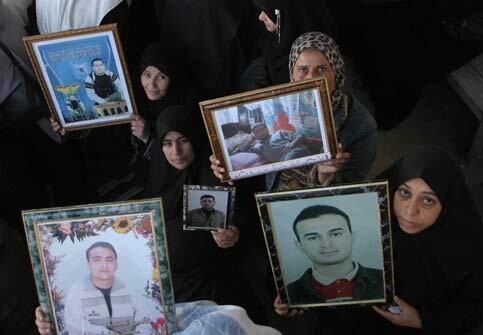Gaza Strip 29 November 2006

Relatives of the Palestinian prisoners demonstrate during a weekly sit-in in Gaza City asking for their relatives to be released from Israeli jails, November 27, 2006. (MaanImages/Hatem Omar)
The title of this piece is not related to Ernest Hemingway’s novel A Farewell to Arms, but is instead a reference to a conflict in the Middle East, the Palestinian-Israeli conflict, particularly the part of that conflict being played out in Gaza, an area which has remained one of the most highly volatile places on this earth for several decades.
In the last decade, the conflicting parties have time and again said “farewell to arms” amidst deaths caused by their conflict, with the hope that such an announcement would save them from more bloodshed.
The past five months saw the most severe round of fighting in Gaza, that has so far claimed the lives of 479 Palestinians (an estimated 80% of whom were not involved in fighting), and resulted in injuries to 4200 others, all by the Israeli military’s weaponry. In the same time period, Palestinian resistance fighters killed three Israelis — two soldiers and one civilian.
In the aftermath of such a horrible period, both sides agreed on Sunday to a ceasefire, with the hope that this would lead to more calm and make way for peaceful means to be used instead.
The United States, patron of the Palestinian-Israeli peace process, voiced the hope that this move would mark a serious breakthrough in the stalled peace talks.
Thousands of Palestinian security personnel have been deployed along the Gaza-Israel border to enforce the ceasefire, while Israeli forces pulled out from areas populated by Palestinians, after Palestinian resistance factions agreed unanimously to halt rocket attacks on nearby Israeli towns.
Lieutenant Colonel Abdelnasser Mesleh, chief of the Palestinian forces commissioned along the border, says that his forces would employ all power at their disposal to prevent any breaking of the ceasefire by Palestinian resistance.
“We will use all power at our disposal to prevent the firing of home-made rockets on Israeli areas, even by force, and we will first implement the ceasefire in the Gaza Strip. Then comes the West Bank,” officer Mesleh maintains.
On the ground, Palestinian resistance factions see the ongoing Israeli attacks in the West Bank as a violation of the ceasefire agreement, as on Monday, two Palestinians, including an elderly woman and a senior resistance fighter, were shot and killed by the Israeli forces in the West Bank town of Qabatia.
Abu Mojahed, the spokesperson of the Salah Eldin Brigades of the Palestinian Popular Resistance Committees, regards the Israeli killings in the West Bank as an Israeli violation of the truce declaration.
“There is no way that we can enforce a ceasefire in the Gaza Strip, while Palestinian blood is still flowing in the occupied West Bank. Just this morning, the Israeli occupation killed the leader of the Salah Eldin Brigades and an elderly woman in Qabatia. Unless the Israeli occupation forces remain committed to the ceasefire and stop aggression on our people in the occupied West Bank, the Zionist entity would open itself to renewed rocket fire,” Abu Mojahed says.
Across the Gaza Strip, Palestinian residents who have been exposed to lethal Israeli arms since late June 2006, appeared somehow optimistic regarding the ceasefire.
Mohamad Alrefa’y, from central Gaza Strip, whose town was invaded by the Israeli army recently, considers this ceasefire as a chance for peace.
“I consider this ceasefire as a temporary truce that might lead to halt of Israeli attacks and leaves room for peace in the region. I hope that the Israelis realize the Palestinians’ genuine will towards peace,” Mohammad comments.
‘Farewell to Arms’, that slogan of the lat author Hemingway, is still imprinted in its readers’ minds. The question here is, will the Palestinians and Israelis’ ‘farewell to arms’ this time be imprinted in Palestinians and Israelis’ minds as the beginning of a new chapter of Palestinian-Israeli relations, ending decades of war and hatred between the two peoples?.
The Gaza Strip, West Bank and East Jerusalem have been occupied by Israel since 1967, as the Palestinian people there have been fighting for the return of their lands, using all possible means at their disposal, the latest of which were crudely-produced home-made rockets.
Rami Elmeghari is a freelance journalist and translator in the Gaza Strip. He may be reached at rami_almeghari@hotmail.com.





